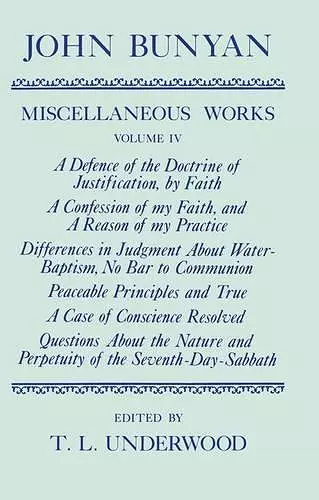The Miscellaneous Works of John Bunyan: The Miscellaneous Works of John Bunyan
Volume IV
John Bunyan author T L Underwood editor Roger Sharrock editor
Format:Hardback
Publisher:Oxford University Press
Published:25th Jan '90
Currently unavailable, and unfortunately no date known when it will be back

As defender of the faith and protector of his flock, at a time of great dissent on matters of theology and religious practice, Bunyan spent much of his energies on disputes, both in person and on the printed page. It was, indeed, such issues that had originally launched him into print in 1656-7 (see Volume I in this series). Six of Bunyan's controversial works, from a much later period of his life, are presented in the present volume. Bunyan directed the earliest of these works, A Defence of the Doctrine of Justification, by Faith (1672) at the latitudinarian rector Edward Fowler. A long-term dispute with some Baptists over open membership resulted in his A Confession of my Faith, and A Reason of my Practice (1672), Differences in Judgment About Water-Baptism, No Bar to Communion (1673) and Peaceable Principles and True (1674). Controversies concerning the status of women and the correct day for Sabbath observance led him to write A Case of Conscience Resolved (1683) and Questions About the Nature and Perpetuity of the Seventh-Day-Sabbath (1685). These polemical works display something of the rough and tumble world of the mechanick preachers of Bunyan's time. They add to our understanding of Bunyan's background, religious stance, and imaginative power and technique. They also reveal some of his personal human foibles.
'Professor Underwood dexterously manages the difficult task of elucidating the points at issues and the course of Bunyan's exchanges with his animadverters. The result is a significant contribution to our understanding both of Bunyan's own commitments and of the intellectual climate of the Restoration.' N.H. Keeble, University of Stirling, Notes and Queries, June 1991
'Many of the introductions to the volumes of The Miscellaneous Works draw out the parallels between the major writings and the various religious tracts. The Bunyan of The Miscellaneous Works is very much a preacher and theologian. As a result of such work on Bunyan's sectarian milieu, Bunyan's relation to his context is coming into ever sharper focus. These beautifully bound and meticulously edited volumes are positive encouragements to the reader. It would be difficult to overpraise them.' Religious Studies Review, Volume 19, Number 1/January 1993
this volume makes important supplemaentary information about Bunyan and the issues of his day available to a broad readership. The tracts are...discussed in the larger historical and ideological context in which they arose. These comments are concise but informative...The texts are presented with a minimum of editorial interference...this edition makes a valuable contribution to both Bunyan scholarship and seventeenth-century studies. * Church History *
Ball accumulates a great deal of evidence for the presence, persistence, and even significance of Seventh-day Sabbatarians. The picture that emerges enriches our understanding of radical religion in seventeenth-century England and its continuations in the eighteenth century ... a work of thorough scholarship, which has documented the importance of a neglected group. The Seventh-Day Men should remain a definitive study of its subject for a long time to come. * Dewey D. Wallace, Jr. George Washington University, Albion *
ISBN: 9780198127321
Dimensions: 225mm x 144mm x 33mm
Weight: 702g
464 pages